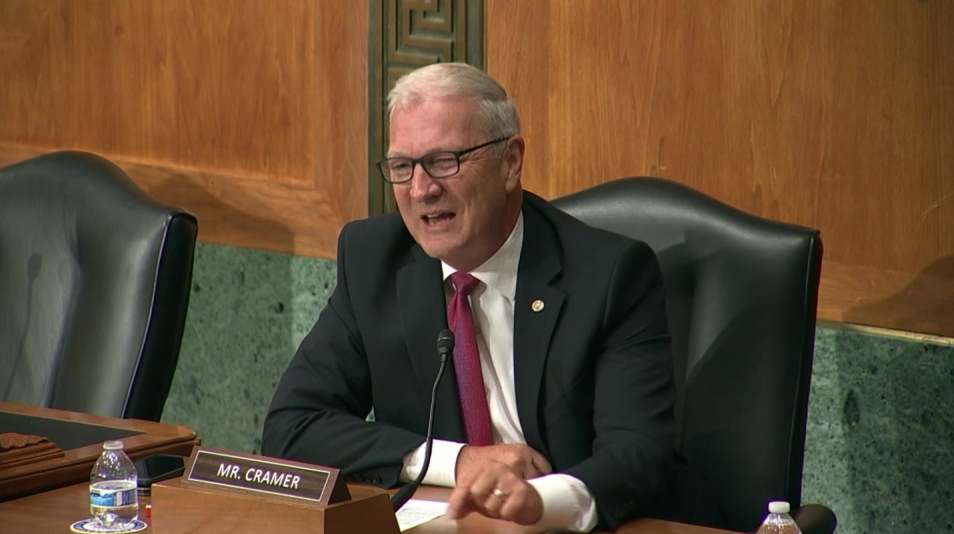Source: United States Senator Kevin Cramer (R-ND)
***Click here to download video. Click here for audio.***
WASHINGTON – U.S. Senator Kevin Cramer (R-ND) discussed the devastating economic and environmental impacts of stifling American energy production during a Senate Banking Committee hearing. He highlighted the indisputable fact that America’s energy production is cleaner, safer, and more cost effective than our global competitors, especially our adversaries. Senator Cramer also emphasized the direct relationship of signals sent by the Biden Administration that disincentivize American energy investment and increased energy prices for Americans.
“The first thing I want to say is in response to the question earlier about the emissions [from] ships bringing natural gas from Russia to the northeast, rather than piping it from Pennsylvania. Let me just tell you, This gets to the heart of one of your issues, Mr. Eberhardt, and that is, let’s produce more American natural gas and American energy. According to data from the National Energy Technology Laboratory at the Department of Energy, Vladimir Putin’s natural gas emits about 50% more greenhouse gas emissions than American natural gas. If we did nothing but displace Russia’s natural gas with America’s, we’d be doing a lot for workers, a lot for our country, and a lot for reducing [global] greenhouse gas emissions. Secondly, I want to get to the real issue of the moment and that is the cost of climate change overreaction. Chairman [Sherrod] Brown talked about the awful CEOs of American companies that are making record profits. If the price signals coming from the [Biden] Administration and from liberals in charge of this place were different, wouldn’t those profits instead be investments in creating jobs and cleaner energy here in United States?” asked Senator Cramer.
“Absolutely Senator. In your first point about the Russian natural gas, I would just like to add that the carbon intensity of oil from Venezuela is twice what it is from American oil. There’s various other countries like that. The carbon intensity from U.S. oil is lower than nearly anywhere else in the world. In addition to the environmental costs and transportation costs, the carbon intensity is lower. So if the ultimate goal is to reduce carbon intensity, and we’re going to have the energy demand anyway, we’re not going to affect energy, we’re going to affect supply. We want to use American energy first anyway,” responded Mr. Eberhart, CEO of Canary LLC. “Secondly, to your point, we want more investment in America, we want more jobs in America, and we do it better, cleaner, and safer and it’s closer. So to me, the logic would dictate to focus on doing the best we can with the natural resources we have in America and try to do it in the cleanest way possible.”
Senator Cramer explained his concern regarding the leadership vacuum in energy development when agencies like the U.S. Securities and Exchange Commission (SEC) regulate outside of their jurisdictional authority, which only cedes market power to adversaries like China and Russia.
“In his opening statement, Chairman Brown referenced that if America doesn’t lead China will. To which I say ‘exactly, that’s my concern.’ If we lead with SEC regulations, for example, that further burden American energy, are we to assume that China’s going to also increase their regulatory scheme or Russia is going to increase its regulatory scheme so they can follow the lead of the United States of America? Is that how global markets work?” asked Senator Cramer.
“Absolutely not Senator and to think that would be naïve. Look, all this ESG investment scoring, we’re handicapping the international competitiveness of American companies and I think it’s ill-advised. These companies in charge they don’t have an ESG score that’s going to negatively impact their banking relationship, their relationship with the government or anything,” responded Mr. Eberhart. “China, Iran, Saudi Arabia, Venezuela, these countries care about profits and bringing in hard currency. They don’t care one iota about the environmental impact of what they’re doing, nor do they care about what it does to their local consumers. We have higher standards in America and we have a better outlook on balancing the environmental [impact] and the environmental cost with the jobs and the economy in what we’re doing. The only country even close to the same standards as us is Canada. The places that you mentioned, Senator have absolutely no incentive to focus on the environment while extracting their natural resources.”
Senator Cramer also discussed the major difference in labor standards between the United States and countries like China and Russia with a pipeline union member.
“Do you think that the workers in China and the workers in Russia are treated as well as workers in the United States?” asked Senator Cramer.
“I can’t answer that,” joked Mr. Butterworth, Northeast Regional Business Agent, Pipeliners Local Union 798. “But I know we follow we follow agreements and our folks are treated well in this country.”
“Well, then let me help you. The labor standards in Russia and the labor standards in China are not as good as labor standards in the United States of America. I’m for an all-of-the-above [energy strategy] like many said. I’m for an America First—not an America Only—but an America First agenda that takes care of workers and the environment. I think we do it better than anybody,” concluded Senator Cramer.
